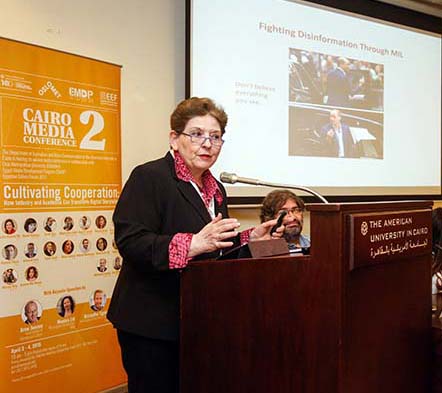“Don’t believe everything you see.”
That’s how Media Unlimited director Magda Abu-Fadil began a presentation with a picture of Britain’s Prince William seemingly giving someone the finger.
Seen from another angle, the Duke of Cambridge looked like he was gesturing with the number three – a significant difference.

Magda Abu-Fadil to Cairo confab: “Don’t believe everything you see.”
She was, once again, beating the Media and Information Literacy (MIL) drum, this time to an audience of students, faculty members, media and others at the American University in Cairo in April 2019 as a panelist at the “Cultivating Cooperation: How Industry and Academia Can Transform Digital Storytelling” conference co-organized by AUC and the Egypt Media Development Program.

AUC-EMPD conference flyer
She told them it can be confusing when ‘information disorder’ comes from the highest authority and showed a video of U.S. President Donald Trump in an Orwellian clip telling his audience not to believe what they saw in the media.
That’s why fact-checker has become a full-time job, like that of reporter, editor, producer, and infographic designer in many news organizations.
Abu-Fadil provided various case studies of MIL, the importance of critical thinking and that in an age of “fake news” and alternative facts students need to grasp the concept of media and information literacy to understand news as a means to detect ‘information disorder’ in obvious and subliminal messages.

UNESCO’s MIL concept
She presented the different types of literacies under the MIL umbrella as defined by
UNESCO: Information literacy, library literacy, freedom of expression and freedom of information literacy, digital literacy, computer literacy, internet literacy, games literacy, cinema literacy, television literacy, news literacy, advertising literacy, and media literacy.
Abu-Fadil said in 2016, UNESCO, the United Nations Alliance of Civilizations and Nordicom at the University of Gothenburg, Sweden, published the “Opportunities for Media and Information Literacy in the Middle East and North Africa” yearbook for which she was the lead editor and key co-author.

Opportunities for Media and Information Literacy in the Middle East and North Africa
A newer book she co-authored for UNESCO is “Journalism, Fake News & Disinformation.” It’s also a university course that can be taught during a whole semester, or as modules in other courses.

Journalism, Fake News & Disinformation
The MU director spoke about entering dangerous territory in the digital era with artificial intelligence (AI), notably deepfake. She showed how a deepfake video is produced and how misleading it can be.
She said students should understand that privacy is dead and that anything they post on social media can (and very likely) will come back to haunt them.

UNESCO’s false experts chart
Another form of “disinformation” is manipulation of information with false experts: in academia, government, science, medicine, finance, the environment, and even the media.
Last, but not least, she plugged an older paper she wrote for UNESCO, “Media Literacy: A Tool to Combat Stereotypes and Promote Intercultural Understanding.”
